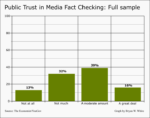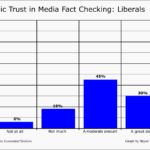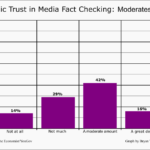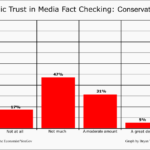In the past month, two pollsters have collected data about how much the public trusts fact-checking.
Rasmussen Reports
On Sept. 30, 2016, Rasmussen Reports surveyed likely voters and found a low level of trust in media fact-checking:
A new Rasmussen Reports national telephone and online survey finds that just 29% of all Likely U.S. Voters trust media fact-checking of candidates’ comments. Sixty-two percent (62%) believe instead that news organizations skew the facts to help candidates they support. (To see survey question wording, click here.)
The Rasmussen survey also found that Hillary Clinton voters were the only group likely to trust media fact-checking. Voters supporting Donald Trump, Gary Johnson, and Jill Stein predominantly distrusted media fact checking.
Unfortunately, Rasmussen framed its survey question as a forced choice. Respondents either trusted media fact checkers or believed news organizations skew the facts according to their bias. So the survey suggests low trust in media fact-checking but gives a very imprecise picture.
The Economist/YouGov
An October 2016 poll by The Economist and YouGov gave roughly similar results, while offering respondents a broader range of options for their answers. Respondents were asked how much they trust media fact-checking and could offer answers on a four point scale ranging from “A great deal” to “Not at all.”
The results preserve some hope for media fact checkers in that a majority of poll respondents (55 percent) have moderate or greater trust in media fact-checking. On the downside, only 16 percent expressed a high level of trust in media fact-checking.
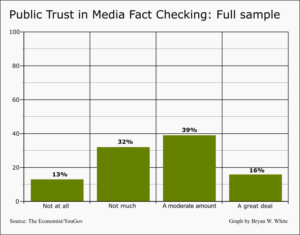 We should also note that the descriptions likely bias respondents toward the second-highest rating. “A moderate amount” would have served better as the middle choice on a five point scale instead of the second-highest choice on a four point scale.
We should also note that the descriptions likely bias respondents toward the second-highest rating. “A moderate amount” would have served better as the middle choice on a five point scale instead of the second-highest choice on a four point scale.
The Partisan Breakdown
A fact checker without public trust is like a king without a country. That only 16 percent place a high level of trust in media fact-checking should set off alarms in the fact-checking community.
The YouGov survey reinforces the main finding of the Rasmussen survey: People who lean left show more trust for fact checkers than do people who lean right. In the YouGov survey, liberals were much more likely than conservatives to trust fact checkers. But only 30 percent of respondents classed as liberals said they trusted fact checkers “a great deal.”
- Liberals
- Moderates
- Conservatives
For moderates, that number dropped down to 16 percent. If these moderates count as the least partisan of the three groups, that low percentage rings another alarm bell for fact checkers. Why wouldn’t moderates trust quality fact-checking?
For conservatives the number plummeted all the way down to 5 percent. Are conservatives simply resistant to reality, though not quite so much so as moderates? Or might they have a sound basis for withholding trust from fact checkers? Whatever the case, the fact checkers have a deep trust deficit with conservatives.
We’re pleased to see pollsters looking at the level of trust consumers place in mainstream fact-checking. We look forward to better poll questions, including questions that look at how the various fact checkers compare in terms of public trust. We dream of an 11 point scale minus the biased descriptions we often see on four point scales.
On a scale of 0-10, with 0 meaning no trust at all and 10 meaning complete trust, how much do you trust the Washington Post Fact Checker?
On a scale of 0-10, with 0 meaning no trust at all and 10 meaning complete trust, how much do you trust FactCheck.org?
Etcetera.
Correction Nov. 2, 2016: We incorrectly described the peak trust level for moderates as 19 percent. We have replaced that wrong figure with the right figure of 16 percent.
